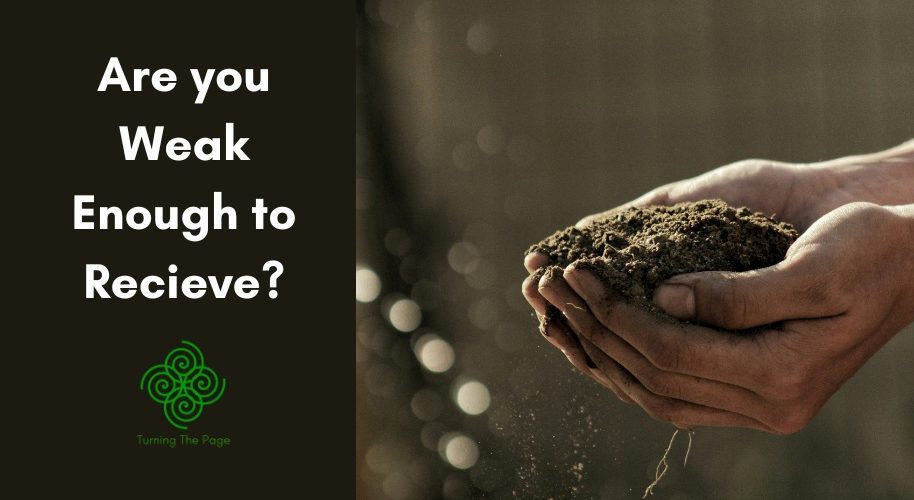We build walls; we build personas, but are we weak enough to receive truth into our innermost being? That is where strength comes out from weakness.
I don’t want to be weak.
I don’t to be known as someone who has nothing to give. I want to move into my world and make a difference.
Much male depression I have found has a strong link to a sense of unfulfilment. A kind of soul impotency. There being no deeply meaningful imprint of a man’s life on the world around him, whether it be his spouse, his family, his career.
Much female depression is linked to an invisibility or a hiding of one’s beauty. ‘Nothing to see here, walk on by, no ‘God delight’ to be shown here.’
I don’t want to be weak, so I flex my muscles, show whose boss, prance and pretend ‘I’m a real man.’
I don’t want to be weak so I will be in control, take charge, but let no one inside.
But often we need to come to a place of absolute weakness to be vulnerable enough to receive.
How are you with weakness?
Recently I have had someone open a door in my life that I didn’t know existed. It felt vulnerable, but also strangely safe. I can’t even put a label on that door. But as it opened, I knew that something good wanted to come out.
Samson the Strong
There is a character in the Bible that is known both for his strength and his weakness.
You can read his story in Judges 13-16
He was built. Muscles, power, strength — he had it all.
One small example is this:
Samson went to Gaza and saw a prostitute. He went to her. The news got around: “Samson’s here.” They gathered around in hiding, waiting all night for him at the city gate, quiet as mice, thinking, “At sunrise we’ll kill him.”
Samson was in bed with the woman until midnight. Then he got up, seized the doors of the city gate and the two gateposts, bolts and all, hefted them on his shoulder, and carried them to the top of the hill that faces Hebron.
But there was also a weakness, a tragic weakness.
Samson the Weak
He had low impulse control. When he saw something, he had to have it. He knew his physical strength was unmatched by anyone so he could move into his world, his way.
This weakness became his undoing when a woman by the name of Delilah came to him.
Some time later he fell in love with a woman in the Valley of Sorek (Grapes). Her name was Delilah. The Philistine tyrants approached her and said, “Seduce him. Discover what’s behind his great strength and how we can tie him up and humble him. Each man’s company will give you a hundred shekels of silver.”
She discovered that his great strength came from a spiritual connection between his long hair and God. When they cut his hair, he would lose all his strength.
So that is what they did to him, then weakened him even further.
The Philistines grabbed him, gouged out his eyes, and took him down to Gaza. They shackled him in irons and put him to the work of grinding in the prison.
But they forgot to keep cutting his hair.
Weakened, but not without strength
Prison cells, dark holes, lost places, dry deserts have a way of bringing past events into reflective focus. In those places, we learn and pray. Humility is often learned through many humiliations. Samson was humbled.
Then his mockers brought him to a celebration of their victory over him. A piece of party entertainment. They wanted to humble him even more.
Everyone was feeling high and someone said, “Get Samson! Let him show us his stuff!” They got Samson from the prison and he put on a show for them.
They had him standing between the pillars.
Samson said to the young man who was acting as his guide, “Put me where I can touch the pillars that hold up the temple so I can rest against them.”
The building was packed with men and women, including all the Philistine tyrants. And there were at least three thousand in the stands watching Samson’s performance.
And Samson cried out to God:
Master, God!
Oh, please, look on me again,
Oh, please, give strength yet once more.
God!
With one avenging blow let me be avenged
On the Philistines for my two eyes!
Then Samson reached out to the two central pillars that held up the building and pushed against them, one with his right arm, the other with his left. Saying, “Let me die with the Philistines,” Samson pushed hard with all his might. The building crashed on the tyrants and all the people in it. He killed more people in his death than he had killed in his life.
In his weakness, he found a new strength.
A door had been opened to him.
My power works best in weakness
Another man, centuries later, would describe a thorn in his flesh. An impedient to movement. The apostle Paul would limp through life with what I believe were all the memories of what he had done to the Early church.
He had hunted down those early believers, killing the faithful. He wanted to exterminate the group they called ‘The Way.’
Those events had brought him to a place of weakness where nothing he could do would be able to restore.
He was totally reliant on grace – getting what he did not deserve.
While feeling the thorn in his flesh, he receives these words from God.
“My grace is all you need. My power works best in weakness.”
He writes out of this weakness these words:
So now I am glad to boast about my weaknesses, so that the power of Christ can work through me.
That’s why I take pleasure in my weaknesses, and in the insults, hardships, persecutions, and troubles that I suffer for Christ.
For when I am weak, then I am strong.
If you’ve ever been exposed, you know the trauma of nakedness.
Everyone can jeer and sneer. They can mock and laugh. They can pull you down, but only if you let them.
Out of that place of weakness, something can grow that is powerful and strong. Something that can’t be destroyed by mere man.
Why this matters for Mental Health?
Your moments of broken weakness are the grounds for something powerful and strong to grow out of from.
Questions?
Comments?
Email me 🙂📨
barry@turningthepage.co.nz
Give a little gift to keep the pages turning
Quotes to consider
- Unless a bishop, teacher, or minister has on some level walked through suffering, failure, or humiliation, his or her words will tend to be fine but superficial, OK but harmless, heard by the ears but unable to touch the soul. Richard Rohr
- Humility is the mother of giants. One sees great things from the valley; only small things from the peak. G.K. Chesterton
- Strength is not the absence of vulnerability. Strength is knowing what your weaknesses are and working with them. Terrence Real
Questions to answer
- When have you been brought to a place where all you can do is to be vulnerable?
- You have messed up. Made terrible decisions. You are vulnerable to everything. What do you most need in those moments?
- ‘Prison cells, dark holes, lost places, dry deserts have a way of bringing past events into reflective focus.’ What have you learned from those places?
Formation exercise
- Write a journal entry about what you have learned from those deeply vulnerable places where you were weak. Think Samson blind and in shackles, and Paul with emotional memory thorns in his feet.
Further reading
Barry Pearman
Photo by Gabriel Jimenez on Unsplash





